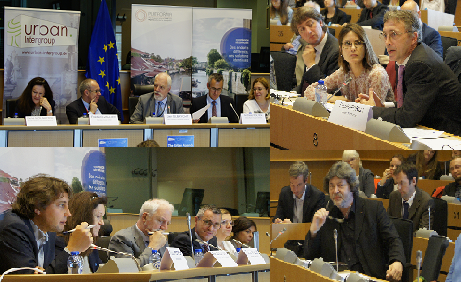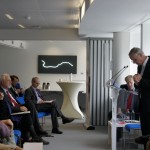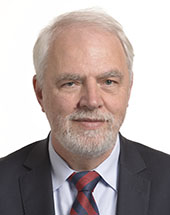HABITAT III – discussion about the role of European local and regional authorities
 Each national delegation has to include a local or regional government representative during Habitat III’s final conference in Quito this autumn. Together, the representatives of the future Slovak presidency, the European Parliament and the Commission have aligned with CEMR and PLATFORMA’s position, presented during the seminar co-organised with the URBAN intergroup on 21 June at the European Parliament.
Each national delegation has to include a local or regional government representative during Habitat III’s final conference in Quito this autumn. Together, the representatives of the future Slovak presidency, the European Parliament and the Commission have aligned with CEMR and PLATFORMA’s position, presented during the seminar co-organised with the URBAN intergroup on 21 June at the European Parliament.
While the seminar was taking place, preparations were already under way for the final conference in Quito (Ecuador), where the new Global Urban Agenda should be adopted. The European Commission representative (DG REGIO) Judit Torokne Rozsa supported the idea of having a local government representative in each national delegation. This idea was strongly endorsed by the Member of the European Parliament (MEP) and President of the URBAN intergroup Jan Olbrycht, who stated:”Let’s fight together for a greater role for local governments.” “We do not want one level to decide for everyone. Local and regional governments have to show the way”, confirmed Elena Szolgayová, representing the future Slovak presidency of the Council of the EU (SKLEU2016). “It is our ambition to support you”. As such, the Deputy Mayor of Cologne, Andreas Wolter, stated: “The European Union needs to support the demands of the Global Taskforce for local and regional governments (GTF) for the recognition of a special status for local governments within the governing bodies of the United Nations and UN Habitat.
The Quito conference is a good thing – but what comes next?
“The Quito conference will not be limited to a simple approval of the agreement by states”, explained the representative of Habitat III, Tobias Kettner. “If it’s true that it will lay the foundations for a new Global Urban Agenda, Quito will also be the opportunity to focus on the action and implementation of the Agenda.” To which CEMR Secretary General, Frédéric Vallier, replied: “With only a few months to go before the conference, our concerns are not only to know who will be responsible for what, but to see how national governments, towns, cities and civil society can work together once the agreement is signed.”
The representative from the NGO Habitat for Humanity, Deepali Sood, pointed out the importance of including citizens and stressed the need to assess the results throughout the process.
Speaking from the floor, MEP Ernest Maragall, member of the URBAN Intergroup, expressed his fears that the agreement might be “kidnapped by national governments”. These words were echoed by another member of the Intergroup MEP Joachim Zeller, who stated: “We do not need yet another agreement written by national governments. The risk we run is that that the whole point of the agreement could be lost; it’s an agreement that concerns urban life, which means towns and cities.”
The director of PLATFORMA, Patrizio Fiorilli, ended the seminar by putting forward several proposals included in PLATFORMA and CEMR’s joint declaration. The main proposals are the following:
- Giving a seat to local and regional governments at the UN process negotiations table;
- Guaranteeing a minimum of at least 20% of national resources to local government;
- Responding to the specific concerns of cities of all sizes and functional areas;
- Supporting co-operation among cities and regions through peer-to-peer capacity building projects and exchange of good practices, both within and outside of Europe;
- Designing the new Urban Agenda in close cooperation with local authorities and constituting a tool for self-assessment on a voluntary basis.
All eyes are now turned to national governments, as they will be the ones to decide on the final agreement.
Habitat III – Tobias Kettner’s presentation
Event on intergartion of refugees in European cities
The URBAN Intergroup jointly with the European Investment Bank (EIB) organised a conference “How Europe’s towns and cities can address current refugee crises?” The event took place on Wednesday April 6th in Brussels’ EIB Office.
In the welcoming speech, Mr Mikołaj Dowgielewicz, Permanent Representative of the EIB to the EU, stressed that the EIB’s aim is to trying to help Members States and cities to handle in the most appropriate way investments needed to respond the unprecedented refugee’s crisis. Jan Olbrycht, President of the URBAN Intergroup, explained that “we need to reflect about the current situation EU cities are facing, but also about the evolution of the whole migration process in the future. Moreover, we should think about the instruments to solve immediately the most urgent problems, and what should be changed in the functioning of the cities.”
The first session of the event focused on the integration of refugees from the EU institutions’ perspective. Representatives of the DG Migration and Home Affairs and of the DG Regional and Urban Policy from the European Commission presented the available instruments to tackle the crisis and possibilities to use them. It has been underlined that from the beginning of the refugee’s crisis, European cities showed great generosity to welcome migrants.
The aim of the second session was to present the issue of refugee’s integration from the European towns and cities perspective. Lambert van Nistelrooij, Vice-president of the URBAN Intergroup, who moderated this part of the seminar, stressed that mayor’s are at the political lead in hosting refugees. CEMR representative drew attention to the fact that the EU institutions and Members States need coordination to better distribute refugees in the whole territory, between big but also small and medium size European cities. EUROCITIES representative presented the main points of its recent report on refugees’ perception and their integration in cities, as well as EUROCITIES statement on asylum in cities. At the end of the meeting, the representative of the city of Amsterdam presented the (issue of the) inclusion of migrants and refugees in the EU Urban Agenda partnership.
In conclusion, Jan Olbrycht noticed that “we are now observing just the beginning of a long-term migration process in the European Union”. The European institutions must therefore start the rethinking of its statistics and reviewing its policies for the future.
EU Urban Agenda partnership on Inclusion of Migrants and Refugees
CEMR resolution on Refugee crisis
Eurocities report on refugee perception and integration in cities
Eurocities Integrating Cities Charter
2nd implementation report 2015 (implementation of Integrating Cities Charter)
Eurocities statement on asylum in cities
Launching event- Strategic Research and Innovation Agenda
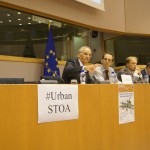 The URBAN Intergroup co-hosted a conference “Transition towards sustainable and liveable urban futures” which took place on Tuesday September 29th at the European Parliament in Brussels. During the event Joint Programming Initiative URBAN Europe launched Strategic Research and Innovation Agenda.
The URBAN Intergroup co-hosted a conference “Transition towards sustainable and liveable urban futures” which took place on Tuesday September 29th at the European Parliament in Brussels. During the event Joint Programming Initiative URBAN Europe launched Strategic Research and Innovation Agenda.
Lambert van Nistelrooij, Vice-President of the URBAN Intergroup, in his conclusions underlined that the event was a “very important initiative” especially in the context of the ongoing works on the EU Urban Agenda. He invited JPI Urban Europe to organise in the future at the European Parliament another meeting to show concrete effects of the implementation of the Strategic Research and Innovation Agenda.
This event was co-organised with JPI Urban Europe (Member State-led initiative set up in 2010 to strengthen European research and innovation in the field of urban development), STOA (European Parliament’s Science and Technology Options Assessment unit) and DG Research and Innovation of the European Commission.
Strategic Research and Innovation Agenda (SRIA) has been developed by JPI Urban Europe “with the ambition to set a scene for and ensure its contribution to a new urban research and innovation paradigm. The SRIA tackles the complexity of urbanisation by bridging the innovation space from strategic research to implementation. It promotes new ways to facilitate urban transition towards sustainable, resilient and liveable urban areas.” JPI Urban Europe
More information about Strategic Research and Innovation Agenda (SRIA)
More information about JPI Urban Europe
URBAN Intergroup – EUROCITIES working dinner
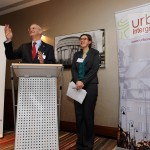
On Wednesday, 25th February the URBAN Intergroup and EUROCITIES held a working dinner “An EU urban agenda – how to make it work”. The event was organised to gather members of the URBAN Intergroup and politicians from Europe’s cities, members of EUROCITIES network.
URBAN-UITP seminar on Energy Efficiency and Urban Transport Systems – 4 March 2014
URBAN Intergroup organized jointly with the International Association for Public Transport seminar on Energy Efficiency and Urban Transport Systems on March 4th in Brussels.
The main goal of the seminar was to better understand the current and future energy and transportation challenges in cities and to discover what practical actions cities and operators (Warsaw Metro, STIB-MIVB) undertake in order to make the urban environment more energy-friendly. Moreover, we discussed necessary political actions in the area of public transport, energy sustainability, climate change and urban life.

